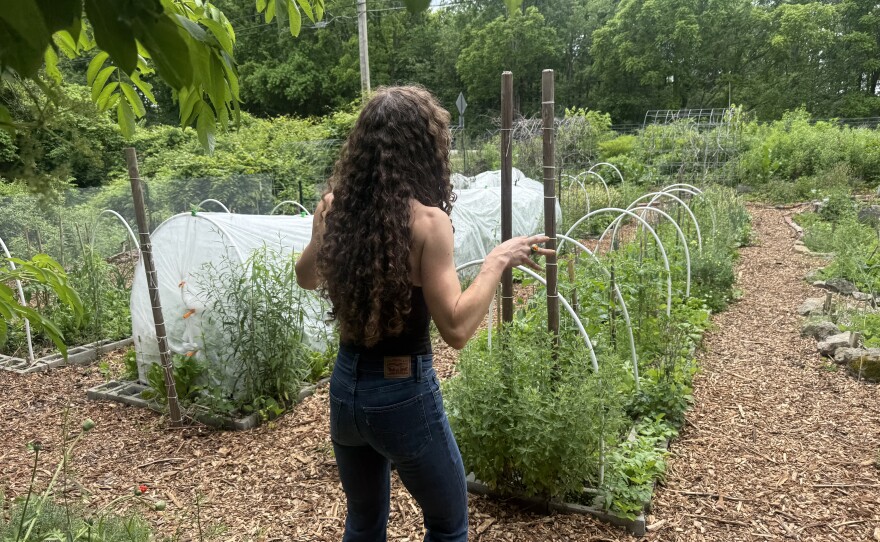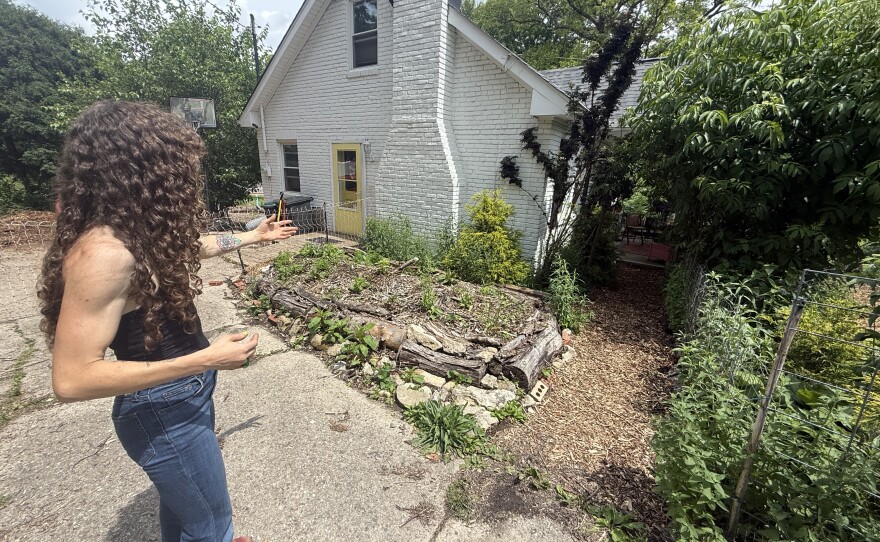Climate change shapes where and how we live. That's why WYSO and NPR are dedicating a week to stories about solutions for building and living on a hotter planet.
About third of human-generated greenhouse gases come from the food system, including agriculture and land use.
In response to this, some urban and suburban families in Ohio have taken matters into their own hands — and yards.
Nestled in a quiet suburban neighborhood in Huber Heights, Taite Kyle and her family run a sizable homestead operation.
"We've gardened since we've been here and we've done tomatoes and all different container gardens and such, but we've really embraced like the actual homestead, get serious and do the thing, in the past two-ish years," she said. "But it's grown really, really quickly and we kind of just fell in love and exploded."
Their current set up provides berries, tomatoes, lettuce, mushrooms and medicinal herbs. Kyle also cares for rabbits and quail. The entire Kyle family helps out on the farm, including her husband, Ben, and their young children.
"Homesteading is kind of like the mindset too — we've always grown food or had plans or been connected in that way," Ben Kyle said. "But then the mindset shifts into homesteading. It kind of takes off because it's all you can think about. It becomes your way of life. "
Taite said one of the reasons her family homesteads is to combat the damaging impact of the nation’s food systems.
"Our individual action can do so much, but really the big impact lies in community support. We need to join together and make things change because nobody's gonna do it if we don't."
“Our supply chain is just not really working and so this is a way that we can provide food in a way doesn't do the harm that our broken chain is doing," she said.
Ben said he also worked for many years in a grocery store and saw first-hand how much uncertainty the nation's food systems operate under.
"I've been in grocery stores and I've seen the fluctuations in like prices or demands even," he said. "Or when we run out of certain things that people can't live without.”
He said through their two-year homesteading journey, they have already started to see some of their native ecosystem grow and thrive.
"There's a balance that has to be restored, I think. And I can feel that in our soil as it regenerates and as the animals come back and some of the fauna comes back," he said. "I've never seen a dragonfly in our yard before but [now] it comes back this time every single year — we wouldn't have a dragonfly if we didn't set up the environment for that. So plant the plants that attract the animals that you want, because they will come. It's almost like magic."
Growing trend
The Kyle family is not alone in their mission to become more self-sustainable.
Lauren Craig owns and operates Humble Hive Consulting in Xenia, offering advice and garden designs to urban homesteaders across the U.S. for nearly four years.
"It's absolutely everyone from every political spectrum, from every socioeconomic spectrum, from every kind of background you could possibly imagine."
"I've been homesteading since 2012, since I had my first child," she said. "I grew up in suburbia in Centerville and so I didn't have that background. And so now, just having had those like trial and error experiences, that kind led to the work that I now do with clients."
Craig has consulted with over 300 clients during this time and installed 99 designs to help them be more self-sufficient and sustainable.
"It's absolutely everyone from every political spectrum, from every socioeconomic spectrum, from every kind of background you could possibly imagine," she said. "I serve clients all across the United States and it could not be more diverse, age range as well. People in their 20s to people in their 70s and 80s. It's incredibly cool."
She said she currently consults with about two to three clients a week.
Beyond cutting back on a consumer's reliance on an inconsistent food system, Craig said homesteading can also help the everyday person be healthier and give back into their own local food systems.
"If you are growing it in your yard, you're working to do it organically, you are not using synthetic fertilizers, you aren't using synthetics like pesticides," she said. "You really have control over those things and how things are done and how that food is produced and how it gets to you. And I think that's incredibly important. Also just investing in local food systems, again, just for local food security, I think is incredibly important."
Dayton neighborhood making plans
As part of her dream to grow urban homesteading across the U.S., Craig said she is working on a project with the Huffman Historic District in Dayton.
This project will bring together the neighborhood for a larger-scale, community run homesteading operation.
"So it's gonna be a homesteading network and so far 10 residences signed up to collaborate together and work to produce more of their own resources," she said. "And so part of that pilot program is kind of going residence to residence and determining what homesteading elements would be best suited for that piece of property, and then providing them with the education to back that up."
The Kyles back in Huber Heights also hope to one day expand their homestead with help from neighbors.
They said to truly make a larger impact on the environment, communities need to work together, much like the Huffman Historic District.
"Our individual action can do so much, but really the big impact lies in community support. We need to join together and make things change because nobody's gonna do it if we don't," Taite said. "The big guys who are making money off of it surely aren't gonna put their foot down for us. If we don't join together, and do something about it, it is not going to get any better."








